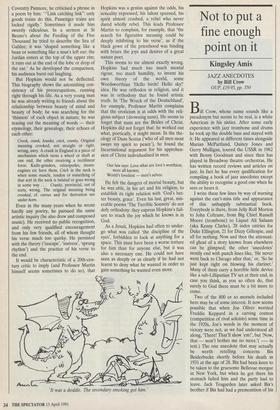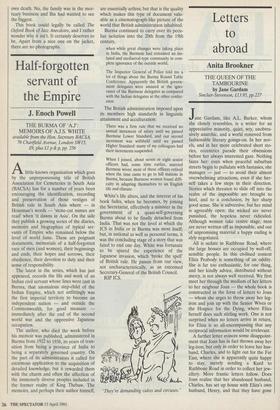Not to put a fine enough point on it
Kingsley Amis
JAZZ ANECDOTES by Bill Crow OUP, £19.95, pp. 350 Bill Crow, whose name sounds like a pseudonym but seems to be real, is a white American in his sixties. After some early experience with jazz trombone and drums he took up the double bass and stayed with it. He appeared at different times alongside Marian McPartland, Quincy Jones and Gerry Mulligan, toured the USSR in 1962 with Benny Goodman and since then has played in Broadway theatre orchestras. He has written record reviews and articles on jazz. In fact he has every qualification for compiling a book of jazz anecdotes except the ability to recognise a good one when he sees or hears it.
I write these few lines by way of warning against the can't-miss title and appearance of this unhappily substantial book. Everybody is there, from Jelly Roll Morton to John Coltrane, from Big Chief Russell Moore (trombone) to Liquat Ali Salaam (aka Kenny Clarke), 28 index entries for Duke Ellington, 21 for Dizzy Gillespie, and all for nothing. Now and then the attenuat- ed ghost of a story known from elsewhere can be glimpsed; the other 'anecdotes' mostly end with punch lines like, 'He never went back to Chicago after that,' or, `So he just kept right on blowing his clarinet.' Many of them carry a horrible little device like a sub-Lilliputian TV set at their end, in case you think, as you so often do, that surely to God there must be a bit more to come.
Two of the 800 or so morsels included here may be of some interest. It now seems possible that when Joe Oliver worsted Freddie Keppard in a carving contest (competition of rival soloists) some time in the 1920s, Joe's words in the moment of victory were not, as we had understood all along, 'There! That'll show 'em!', but 'Now, that — won't bother me no more.'( — in text.) The one anecdote that may actually be worth retelling concerns Bix Beiderbecke shortly before his death in 1931 at the age of 28. Bix had been keen to be taken to the gruesome Bellevue morgue in New York, but when he got there his stomach failed him and the party had to leave. Jack Teagarden later asked Bix's brother if Bix had had a premonition of his own death. No, the family was in the mor- tuary business and Bix had wanted to see the biggest.
This book could legally be called The Oxford Book of Jazz Anecdotes, and I rather wonder why it isn't. It certainly deserves to be. Apart from a nice one on the jacket, there are no photographs.



























































 Previous page
Previous page